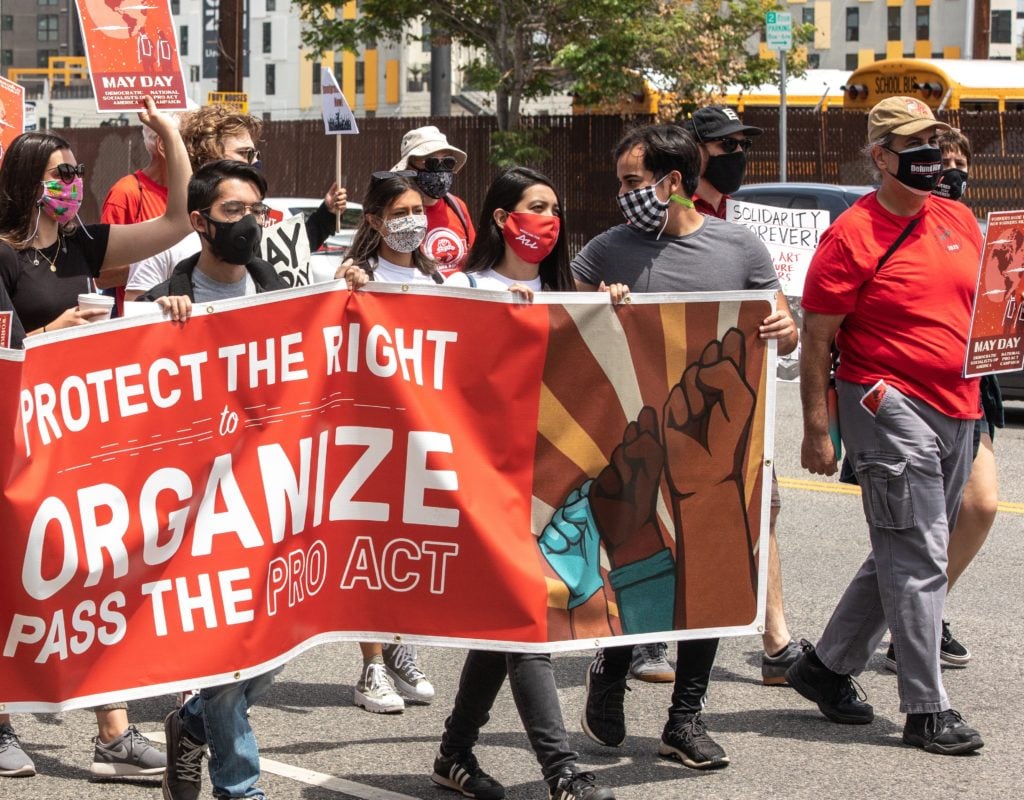This is the second installment of Organizing Upgrade’s new interview series, “Mapping the Moment.” We’ll be talking with activists and organizers about pressing issues and strategic questions that define the terrain our movements work in. To start, we asked people how they understand the Democratic Party at the moment. How do we understand the rifts in the party as a new economic policy direction emerges? How do we push moderate Dems and take advantage of openings for leftists and progressives – while fighting the Right at the same time? Maikiko James is a member of the National Political Committee of the Democratic Socialists of America (DSA) and the Socialist Majority Caucus. In this interview, she talks about winning and deepening real gains for people. “We have to be strategic in holding anyone with power to account. We can’t go back to how it was before the pandemic,” she says.
What are the implications for the left, given the pretty unexpected turn away from wholesale neoliberalism by the Biden wing of the Democratic Party? And how do we account for the leftward shift of the front against the right given the right’s hard turn to be anti-democratic?
Maikiko James: The pandemic has made the starkness of our circumstances so clear. How could the Biden Dems not be responding the way that they have been? There are millions unemployed and miles-long bread lines, with billionaires getting exponentially richer. There’s no way around these circumstances. I hope the actions taken so far by the Biden wing are reflective of their recognition of people’s material needs. We can’t “Build Back Better.” We simply have to take care of people. The choices being made by the Biden wing are materially and symbolically trying to demonstrate that they know people are struggling. Ultimately though, their priority is restoring the stability of the current system and therefore their own leadership and perceived legitimacy. They have different goals than we do, but this creates big opportunities for the left to push parts of our agenda forward.
The left supporting any choices made to mitigate the suffering of working class people is good. However, we also need to push harder and make sure we don’t backslide. For instance, a $2 trillion infrastructure policy is not enough. We have to institutionalize it and build on the momentum that those policies generate. The pandemic isn’t going away anytime soon, and the corporate Democrats recognize that. The pandemic hits so close to home for all of us, so the shifts in position are a part of our times. But we have to be strategic in holding anyone with power to account. We can’t go back to how it was before the pandemic.
You mentioned that the left has to push back on Biden when he is doing things wrong (politically speaking). What do you make of his domestic priorities, initiatives, and policies?
MJ: The Biden relief bill focuses on jobs and he supports the PRO Act. These are examples of him moving in the right direction. Will it be enough? Probably not, but time will tell. Domestically he demonstrates a surprising understanding of how people are currently feeling. However, I think foreign policy has to be taken into account as well. Given his response to Palestine and a doubling down on Israel’s “right to defend itself” I’m deeply concerned that a violent status quo is still entrenched. The left must ardently stand up to this as it affects all of us, regardless of where we live.
As for the labor movement, the signs are positive. We have to be vigilant and vocal with the Biden wing on this issue. We must figure out how to maintain power in Congress.
We see glimmers of openings around things like the environment, with more that needs to be amplified. From the DSA standpoint, we have to help realize a Green New Deal. Will Biden try to rein that in? We don’t have time for that, the planet is burning. How do we use the progression of COVID relief into planet/climate relief? We need to help increase the political will to get it done.
DSA has made the decision to throw down around the PRO Act. How did DSA settle on the fight around the PRO Act?
MJ: The PRO Act represents an opportunity to give workers power in a way unseen, at least in my lifetime. The vast majority of DSA understands that, right now, we need to build power. And that means fighting for power in the workplace, for the right to organize at the site of struggle most familiar to people. Ultimately, this means pushing for transformative reforms that are moving away from neoliberalism, and we can’t do it alone. This particular campaign generates a momentum through active coalition with unions and the many people who are dissatisfied with the state of workers’ rights. As socialists, it’s a fairly clear choice.
How is DSA thinking about possible advances for the labor movement? And what could labor’s role be in the broader fight against the right?
MJ: Labor growing its power and visibility holds so much potential, despite the labor movement being the smallest it has ever been. Its increased levels of attention in the media and public sphere indicate positive shifts in how people view the labor movement. It points the way towards what could be possible with a more militant labor movement in the halls of power.
We also want to push the labor movement left for it to be more democratic and extend its power. It’s been interesting to see people re-recognize the power of unions and collective work. It almost feels surreal, as if from some bygone era. Workers organizing collectively make it clear how the oligarchy can be pushed in a tangible way.
Biden’s generation differed from Obama’s in that they held a similar recognition of the power and importance of labor. You see the strength in unions and see that that’s how you democratize and make power accessible with workers having control over their circumstances. And we see some examples of workers today pushing back on exploitation and low wages. Then they walk from one fight to the next with a resolve to continue fighting against other ways they’re exploited. People realize they have more agency than they may have thought.
In terms of the PRO Act, we saw what could be accomplished in the Senate by trying to flip people. There’s an incredible number of supporters plugging into this work to flip targets. People are mobilizing voters by making connections with them on the ground and hearing how people are living right now.
This contrasts with times of trying to engage people in, for example, vast “Save the Planet” kinds of work. They couldn’t see the tangible impact, which made it harder to engage them. The animation that DSA has picked up on is undeniable. And the relationships we have with unions are inspiring.
This PRO Act work can then progress into a jobs focus and Green New Deal efforts. The Democratic Socialist Labor Commission and the EcoSocialist Working Group of DSA are leading this particular campaign in collaboration. We are asserting that the PRO Act fight is the preamble to getting green jobs. And we are making sure that labor is a force for this. This is not a one-and-done action. The campaign evolves to us fighting environmental racism, for jobs guarantees, and fighting climate catastrophe through the workforce.
Who has DSA worked to flip in the Senate to support the PRO Act?
MJ: Senators Joe Manchin and Angus King have flipped. We’ve made over 700,000 calls. And we’ve had great collaboration with unions like Communications Workers of America (CWA) and the International Union of Painters and Allied Trades (IUPAT). While there are still Senate holdouts, there has been a groundswell of support. It’s interesting to see holdouts like Senator Sinema, who are increasingly regarded as being against the workers in this case. And it’ll be curious to see how our pressure impacts those Republicans who have said they care about labor. We can tell them, “How could you keep this from people?” We can parallel it to the conservatives who opposed the relief packages. There’s no way around the wrongheadedness of those choices.
What does the fight against the right look like?
MJ: We need to take care of people now. The reactionary, Trumpist arm of the right is not putting out anything about taking care of people. We can show they’re a group that doesn’t care about people. People may have cultural adherences to them because they are afraid of something changing. But how could you be more fearful than losing your livelihood, healthcare, and your ability to breathe? The more we can show that what we are fighting for will bring material relief to people, the more ammunition we have against them. I’m not saying that the right is not a threat because they certainly are. They have power and can control the narrative. But I see people wanting not to struggle so hard to survive and needing hope more than anything.
Any other closing thoughts?
MJ: Though DSA has focused on the federal level, we are looking at the ways to build local and state-based power, and we are finally growing our numbers to explore that. When engaged there, people start to understand the structure of power. We are socialized not to talk about politics and not to look at how power functions in our world. Passing statewide legislation and pushing on ballot measures, and electing candidates, we demonstrate to people what’s possible. Building our ability to push levers there lets us push back on the narrative that white supremacy is here to stay and on the idea that this is all some big culture war.
There are things we have to keep pushing, like Medicare for All. The left needs to continue figuring out how we can push the narrative of access and then turn that into wins. COVID is still real, and healthcare disparity beyond COVID is still real, making it a strategic area for vigilance. We also should fight around policing. There is a danger in us moving away from an abolition framework if it’s not clearly laid out. There’s an opportunity for the left to continue pushing the center and left of center because the animation and imagination of people are still there. So, we have to have some optimism.
Did you enjoy this article?
We're in the middle of our annual fund drive, and this year we're building our own internal infrastructure for subscriptions, meaning more of every dollar pledged goes to fulfilling our mission. Subscribe today to support our work and be a part of Convergence's next evolution.

